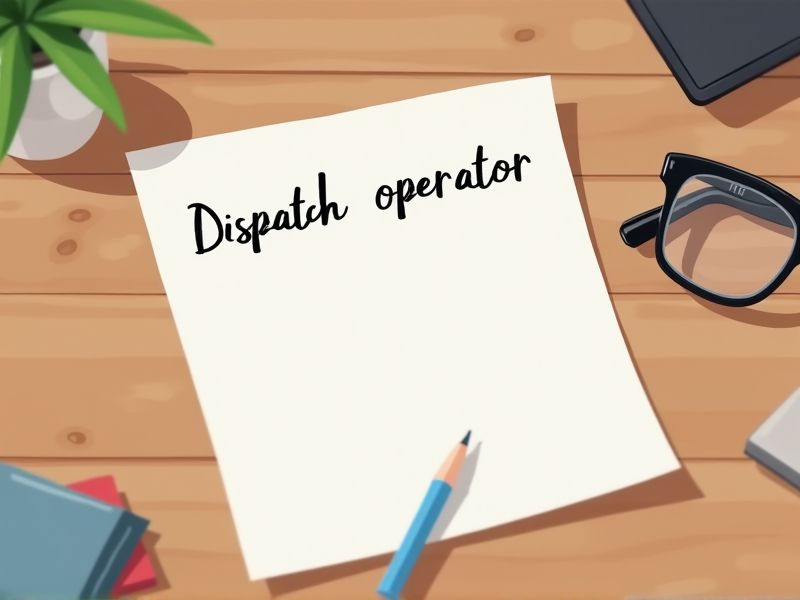
Dispatch operators play a critical role in ensuring efficient communication and coordination between various teams, impacting response times and overall operational effectiveness. Certifications provide dispatch operators with specialized training, equipping them with essential skills for handling emergencies and complex logistical tasks. These certifications are vital to standardizing practices, reducing errors, and maintaining safety protocols across different scenarios. Here are some key certifications that are essential for a dispatch operator.
Emergency Medical Dispatcher (EMD) Certification
Emergency Medical Dispatcher (EMD) Certification ensures that dispatch operators possess the critical knowledge to assess medical situations effectively over the phone. This certification standardizes training, which enhances accuracy in prioritizing emergency calls and deploying appropriate medical resources. Without this qualification, the likelihood of miscommunication or delay in response increases, potentially jeopardizing patient safety. EMD Certification equips dispatchers with protocols for delivering essential pre-arrival instructions, thereby improving patient outcomes before medical personnel arrive.
Public Safety Telecommunicator (PSTC) Certification
Public Safety Telecommunicator (PSTC) Certification is needed for dispatch operators because it standardizes training across emergency call centers, ensuring consistent response protocols. Certified dispatch operators are more adept at handling high-pressure situations, reducing the likelihood of errors during emergency communications. Certification reinforces the knowledge of technologies and systems used in dispatch, improving efficiency in coordinating responses. The credential also builds public trust, as communities gain assurance that their emergencies are managed by qualified professionals.
Certified 911 Dispatcher Credential
Certified 911 Dispatcher Credential ensures standardized training, leading to consistent and efficient emergency response. This credential elevates dispatcher knowledge of communication technology and crisis management, which directly impacts public safety outcomes. Without this certification, dispatchers may lack the necessary skills to handle high-pressure situations effectively. It also offers legal protection for emergency services by verifying that dispatchers meet regulated professional standards.
Basic Life Support (BLS) Certification
Basic Life Support (BLS) Certification equips dispatch operators with essential life-saving skills, enhancing their ability to guide bystanders during emergencies. This certification ensures operators understand critical medical concepts, improving the accuracy and quality of their instructions. Dispatch operators with BLS certification can better assess and prioritize calls, leading to more efficient emergency response. With BLS training, operators gain confidence, which can reduce errors and improve outcomes in high-pressure situations.
CPR and First Aid Certification
Dispatch operators often serve as the first point of contact in emergency situations, requiring them to provide accurate guidance until help arrives. CPR and First Aid Certification equips them with essential knowledge, enabling them to offer critical instructions during life-threatening incidents. Proper certification enhances their confidence, reducing the potential for error in high-stress environments. Standardizing such training across dispatch operators can lead to improved emergency response outcomes and increased survival rates.
Hazardous Materials (HazMat) Awareness Certification
Hazardous Materials (HazMat) Awareness Certification for dispatch operators ensures accurate identification and assessment of hazardous substances, thereby preventing potential accidents or exposure. This certification equips them to relay critical information to first responders effectively, enhancing response strategies and safety measures. Enhanced knowledge of regulations and protocols reduces the risk of non-compliance with safety guidelines, keeping operators and communities safe. Training fosters efficient communication during emergencies, minimizing response time and improving coordination among emergency services.
Transportation Worker Identification Credential (TWIC)
Transportation Worker Identification Credential (TWIC) is required for dispatch operators to ensure secure access to maritime facilities and vessels, safeguarding against unauthorized entry. Mandating TWIC helps verify the identity and background of individuals, reducing potential security risks. Compliance with federal regulations necessitates TWIC, as dispatch operators often work in environments with sensitive information. The presence of TWIC reinforces a standardized security measure across the transportation sector, enhancing overall operational safety.
Customer Service Excellence Certification
The Customer Service Excellence Certification ensures dispatch operators develop enhanced communication skills, leading to more effective interactions with clients. This certification provides operators with structured problem-solving techniques, which contribute to quicker resolution times and increased customer satisfaction. Consistent service excellence training reduces the likelihood of errors, which in turn minimizes potential service disruptions. Earning this certification can improve the overall reputation and reliability of the dispatch center, attracting more clients and business opportunities.
Fleet Management and Logistics Certification
A Fleet Management and Logistics Certification equips dispatch operators with the necessary skills to efficiently coordinate and manage vehicle fleets, leading to improved operational productivity. Understanding logistics principles through certification helps dispatch operators minimize costs and optimize routes, which can enhance overall business profitability. The certification empowers dispatch operators to effectively use fleet management software, resulting in accurate tracking and better decision-making. Acquiring industry-specific knowledge through certification allows operators to ensure compliance with regulations, which is crucial for maintaining the company's reputation and avoiding legal issues.
Critical Incident Stress Management (CISM) Certification
Dispatch operators frequently encounter high-stress and traumatic situations, making them susceptible to critical incident stress, which can impair job performance. The Critical Incident Stress Management (CISM) Certification equips them with strategies to manage stress, promoting mental resilience. Certification programs enhance operators' ability to provide peer support, creating a supportive environment that mitigates long-term psychological effects. Organizations benefit from reduced turnover rates and increased efficiency, as certified operators are better prepared to handle emergency situations with professional composure.
Summary
When you obtain certifications as a dispatch operator, your expertise in handling emergency situations becomes widely recognized. This enhanced skill set often leads to increased efficiency and accuracy in dispatching tasks. You may also gain better job opportunities and career advancement due to the validation of your abilities. Overall, certified dispatch operators contribute to improved response times and communication within emergency services.
